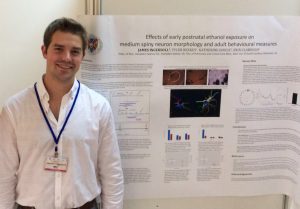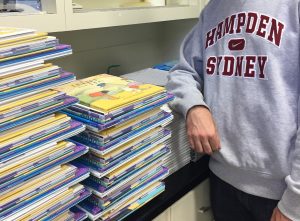My name is James Ingersoll ’18 and I’ve spent my summer working on a research study about the benefits of reading to your children. Before I talk about the research I’m working on this summer, I would like to talk about how I started my summer. The first day of my summer I was on a plane headed towards Madrid, Spain for a conference. I was fortunate enough to have the work I did during my 2016 H-SC summer research fellowship selected as a presentation poster at the Society for Neuroscience (SfN) in San Diego last November. I continued this work characterizing the neuronal changes that occur after fetal alcohol exposure by taking 6 credits of Biology Independent Research with Dr. Erin Clabough during the 2016-17 school year.

Jamie Ingersoll presents his work at the International Behavioural Neural Genetics Society Annual Meeting in Madrid
This last spring I was invited to the International Behavioural and Neural Genetics Society (IBANGS) conference in Madrid in May, so the day after graduation I was in Madrid attending the IBANGS conference as the only undergraduate there. I was a bit nervous going into the conference as I was the youngest attendee, but these nerves quickly subsided, as everyone at the conference was incredibly nice and personable. The conference was very different from SfN in San Diego, which was enormous. IBANGS was small, and everyone there were working on very interesting things, which was very cool to be able to hear more about. I had an incredible time in Madrid and am truly thankful for the young investigator travel award I received from IBANGS, as well as funding from H-SC, to allow conference attendance.
This summer, I’ve received a 2017 H-SC Summer Research Fellowship to continue this neuronal characterization, and to begin working on a research study that focuses on understanding better the benefits of reading to children, and if this reading alters the way children think or feel about others. Although these two projects may not seem related, both target synaptic plasticity, or the way that neurons can change in response to the environment. Sometimes these changes are negative, like in the case of early ethanol exposure, or they can be positive, like early exposure to reading.
Recruitment for this reading study has been a little tricky because a lot of parents are interested, but the children aren’t always as interested and if the kids say no, then I can’t enroll them into the study. It’s also been tricky because of vacation schedules. A lot of families have planned vacations that would interrupt the daily reading requirements of the study. Because of these factors, I haven’t been able to hit the numbers I intended on at the start of the study. These setbacks still don’t rival how much fun it’s been to work with children on something so interesting. I’m now working on running a statistical analysis on the data, and hope to have the stats done soon. I hope that my findings will prove to be useful for young families, help young kids be more school ready, and also allow us to learn more about synaptic plasticity.

